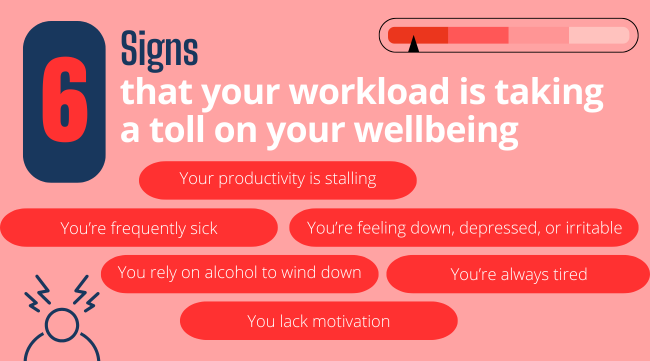
In today’s fast-paced work culture, pushing through exhaustion has almost become a badge of honor. But at what cost? Your body has a way of signaling when it’s reaching its limit, and ignoring those warning signs can lead to serious physical and mental health consequences. From chronic fatigue to frequent headaches and unexplained aches, overwork can slowly wear you down without you even realizing it. If you’ve been feeling off lately, it might be time to listen to what your body is trying to tell you. Here are six key signs that your workload is taking a toll on your well-being.
1) Your productivity is stalling
Pushing yourself to the limit might seem like the key to getting more done, but overwork often has the opposite effect—your productivity starts to stall. When you’re constantly running on empty, your focus blurs, decision-making slows, and even simple tasks feel overwhelming. Instead of powering through, your brain and body start to resist, leading to mistakes, procrastination, and burnout. Working longer hours doesn’t always mean working smarter; in fact, it can drain the creativity and efficiency that drive real progress. Recognizing when overwork is hurting your output is the first step toward breaking the cycle and restoring balance.
2) You’re sick all the time
If you find yourself often battling colds, headaches, or lingering fatigue, your workload might be to blame. Overworking weakens your immune system, making it harder for your body to fight off infections and recover properly. Chronic stress from long hours and lack of rest increases cortisol levels, which can disrupt sleep, deplete essential nutrients, and leave you more vulnerable to illness. If you’re always reaching for cold medicine or struggling to shake off exhaustion, it’s a clear sign that your body is overworked and in need of rest. Ignoring these symptoms can lead to more serious health issues down the road, so it’s crucial to slow down and prioritize recovery.
3) You’re feeling down, depressed, or irritable
If you’ve been feeling unusually down, irritable, or even angry, your workload could be the culprit. Overworking doesn’t just drain your physical energy; it takes a serious toll on your mental and emotional well-being. Chronic stress and exhaustion can deplete essential neurotransmitters like serotonin and dopamine, leading to mood swings, anxiety, and even depression. You may find yourself snapping at loved ones or struggling to find joy in things you once enjoyed. Ignoring these emotional red flags can push you further into burnout, making it even harder to bounce back. Recognizing that your mood shifts might be linked to overwork will help you reclaim balance and prioritize your mental health.
4) You are always tired
Constant exhaustion, no matter how much sleep you get, could be caused by overwork. Pushing yourself too hard depletes your body’s energy reserves, leading to chronic fatigue that rest alone can’t fix. Stress and long hours can also disrupt your sleep quality, preventing your body from fully recharging even if you’re spending enough time in bed. Over time, this exhaustion can become a vicious cycle—draining your focus, slowing productivity, and making everyday tasks feel overwhelming. If you’re waking up just as tired as when you went to bed, it’s a clear sign that your workload is taking a serious toll, and your body is begging for real recovery.
5) You need alcohol to relax and wind down
The need to reach for a drink more often to unwind after long, stressful days can be a red flag that overwork is taking a toll on you. Many people turn to alcohol as a way to relax, numb stress, or temporarily escape the pressures of an overwhelming workload. However, self-medicating in this way can quickly become a harmful cycle, masking deeper issues like burnout, anxiety, and exhaustion instead of addressing them. Over time, reliance on alcohol can further disrupt sleep, worsen mood swings, and even impact productivity, ultimately making the problem worse. If you notice that your after-work drink has become a necessity rather than a choice, it may be time to step back and reassess how your workload affects your well-being.
6) You lack motivation
Overwork can cause you to go from being engaged and motivated to feeling cynical and disconnected from your work. When you push yourself too hard for too long, burnout can set in, making once-meaningful tasks feel pointless and frustrating. You might catch yourself rolling your eyes at meetings, feeling resentful toward colleagues, or simply going through the motions without real investment. This emotional detachment is your mind’s way of coping with exhaustion and prolonged stress, signaling that your workload has become unsustainable. If you no longer care about the job you once enjoyed, it’s time to step back, reassess your boundaries, and prioritize recovery before burnout takes an even greater toll.

Recognizing the signs of overwork is the first step toward protecting both your health and productivity. Your body and mind are not designed to run on empty, and ignoring these red flags can lead to long-term consequences. Instead of pushing through exhaustion, take a step back, reassess your workload, set healthier boundaries, and prioritize rest. Productivity, creativity, and overall well-being thrive when balance is maintained. Remember, success isn’t just about how much you work. It’s also about how well you take care of yourself along the way.
For more work/life balance tips, subscribe to The JOHNLEONARD Blog below!
